Books
Books
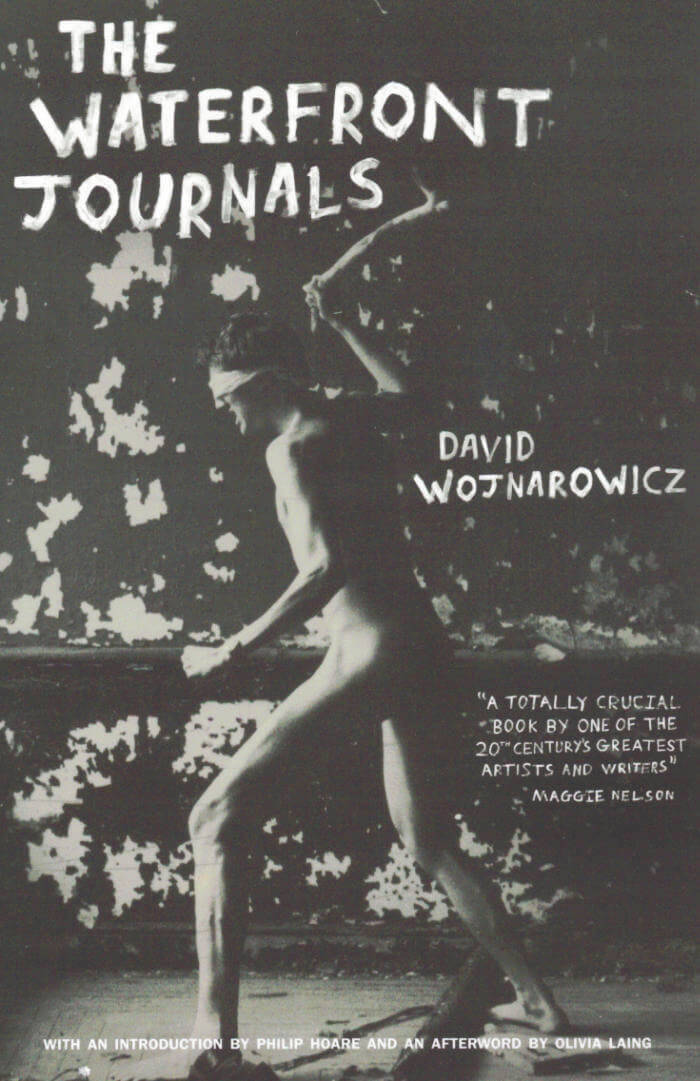
The Waterfront Journals
A visceral and carnivalesque mosaic of life at the fringes.
The Waterfront Journals is a road trip through the sensuous, perilous landscape of alternative America—a series of fictional monologues that ventriloquise the real people Wojnarowicz met on his travels while he was sleeping rough.
We meet these hustlers, runaways and dreamers in unassuming locations—in truck stops, bus stations and parks. Their stories are disturbing, often shocking; but they’re told with an honesty and a hallucinatory intensity that simply demands to be heard.
Published for the first time in the UK, this electrifying collection confirms that David Wojnarowicz was not only one of millennial America’s most necessary and visionary artists, but also among its most humane and urgent literary chroniclers.
Praise for The Waterfront Journals
A totally crucial book by one of the 20th century’s greatest artists and writers.—Maggie Nelson
Wojnarowicz proves that the difference between the rules of poverty and those of a dream is nothing more than smoke. The termination point of American life examined by the terminal American artist.—Jarett Kobek

Men and Apparitions
MEET EZEKIEL HOOPER STARK, cultural anthropologist and bemused commentator on the contemporary world. Zeke has carved out an academic career studying family photographs, gender and images. Meanwhile – now 38 – he still contends with his own family’s perversities and pathologies, which charge his chaotic love life.
While living in London, Zeke finds himself spiralling into crisis. As the centre ceases to hold, so too does any pretence of his having a dispassionate, purely academic interest in these issues.
Zeke finds a new research topic: himself. He embarks on a quixotic new project, studying the ‘New Man’, born under the sign of feminism. What, he asks his male subjects, does masculinity mean today, in a world in which all the old models are broken? What do you expect from women? What do you expect from yourself? Meanwhile, what will the reader make of Zeke – is he enlightened or misguided, chauvinistic or simply delusional?
Kaleidoscopic and encyclopaedic, comic, tragic, and philosophical, Men and Apparitions showcases Lynne Tillman not only as a unique novelist but also as one of our most important contemporary thinkers on art, culture and the politics of gender.
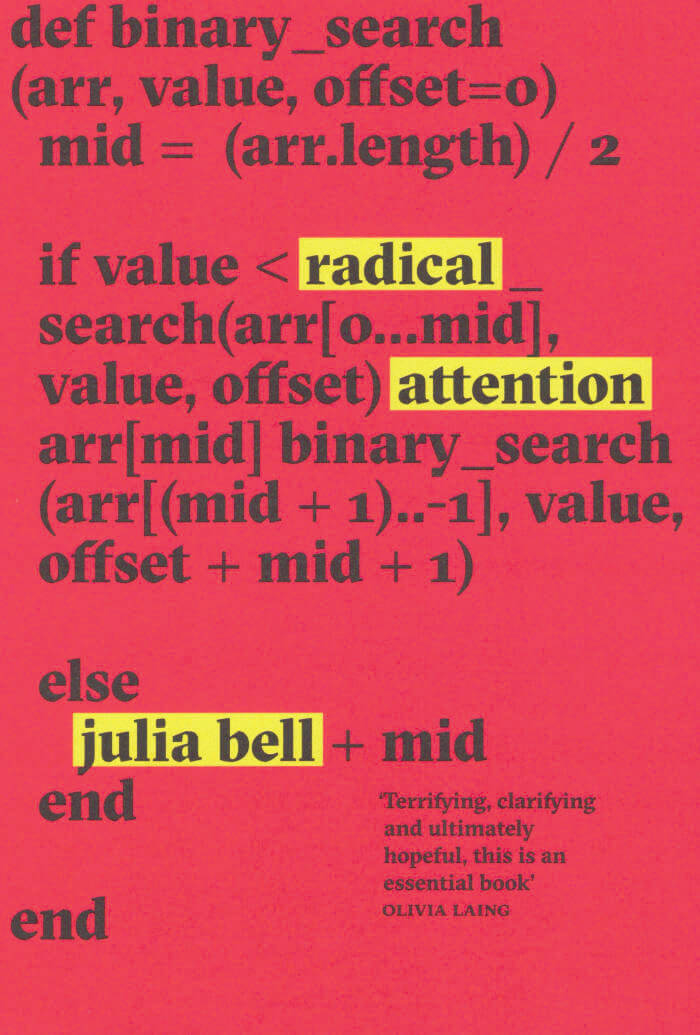
Radical Attention
An essay on the battle for our attention in the age of distraction.
Attention pays. In today‘s online economy it has become a commodity to be bought and sold. Bombarding us with free smartphone apps and news websites, developers and advertisers have turned what and how focus our attention into the world‘s fastest growing industry.
In exchange for our attention, information and entertainment is ever at our fingertips. But at what cost? In this essay, at once personal and polemical, meditative and militant, Julia Bell asks what has been lost in this trade off. How can we reclaim our attention? In a world of infinite distraction, how can attention become radical?
Praise for Radical Attention
‘Terrifying, clarifying and ultimately hopeful, this is an essential book. Julia Bell grapples with the grim realities of our online lives, setting out possibilities for resisting and reclaiming our imperilled freedoms.’ — Olivia Laing
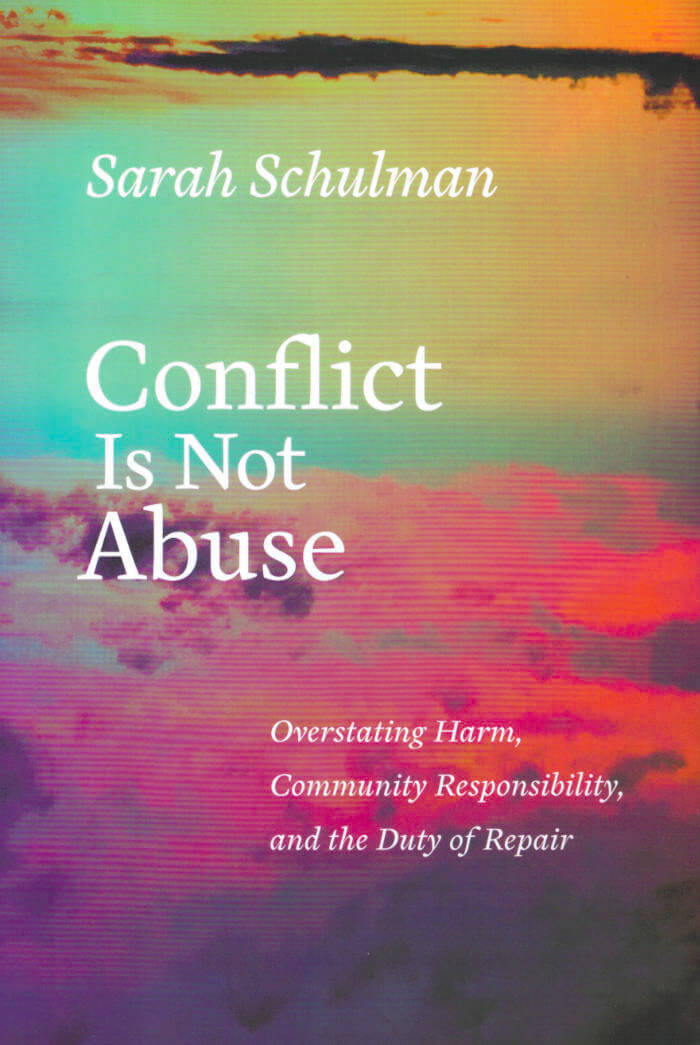
Conflict Is Not Abuse
From intimate relationships to global politics, Sarah Schulman observes a continuum: that inflated accusations of harm are used to avoid accountability. Illuminating the difference between Conflict and Abuse, Schulman directly addresses our contemporary culture of scapegoating. This deep, brave, and bold work reveals how punishment replaces personal and collective self-criticism, and shows why difference is so often used to justify cruelty and shunning.
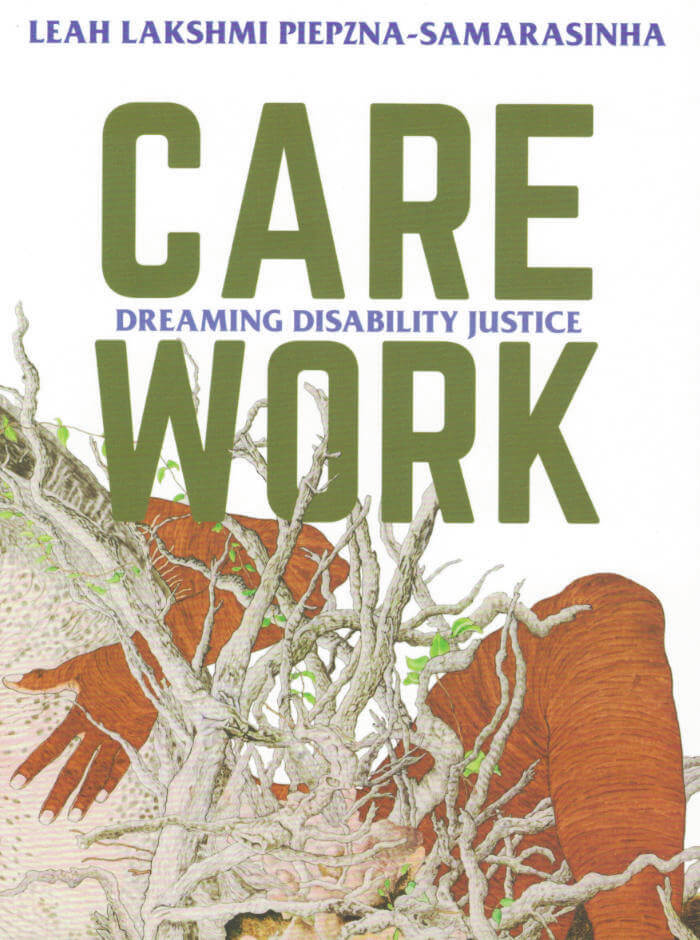
Care Work
Leah Lakshmi Piepzna-Samarasinha
Lambda Literary Award winning poet and essayist and long-time disability justice advocate Leah Piepzna-Samarasinha writes passionately and personally about disability justice in her latest book of essays. Discussing subjects such as the creation of care webs, collective access, and radically accessible spaces, she also imparts her own survivor skills and wisdom based on her years of activist work, empowering the disabled - in particular, those in queer and/or BIPOC communities - and granting them the necessary tools by which they can imagine a future where no one is left behind.
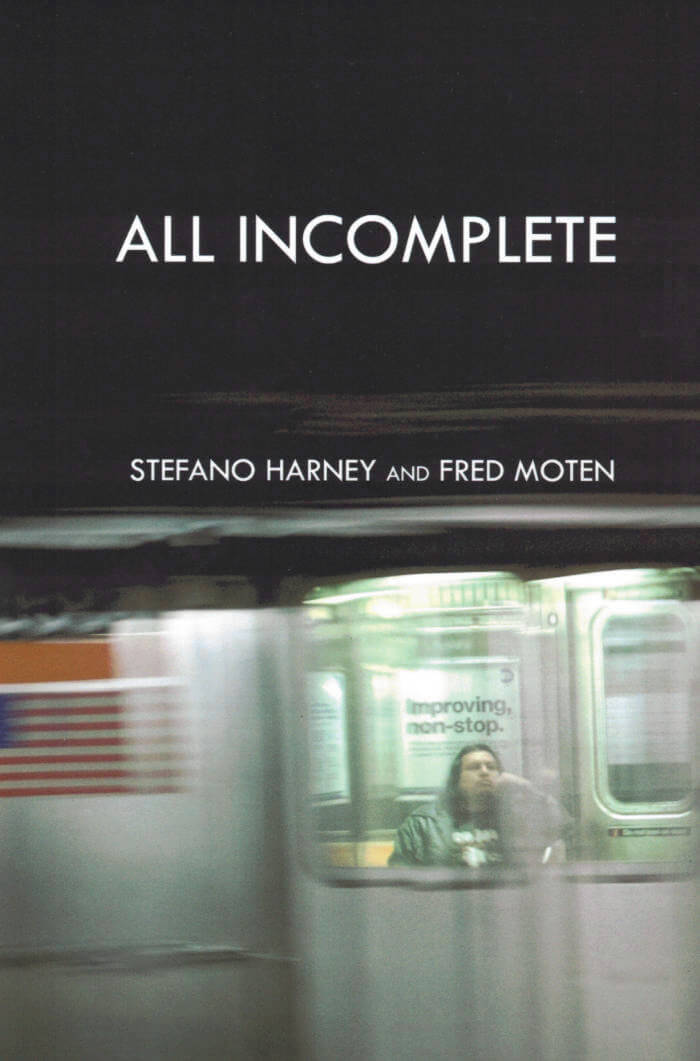
All Incomplete
Building on the ideas Harney and Moten developed in The Undercommons, All Incomplete extends the critical investigation of logistics, individuation and sovereignty. It reflects their chances to travel, listen and deepen their commitment to and claim upon partiality. All Incomplete studies the history of a preference for the force and ground and underground of social existence.
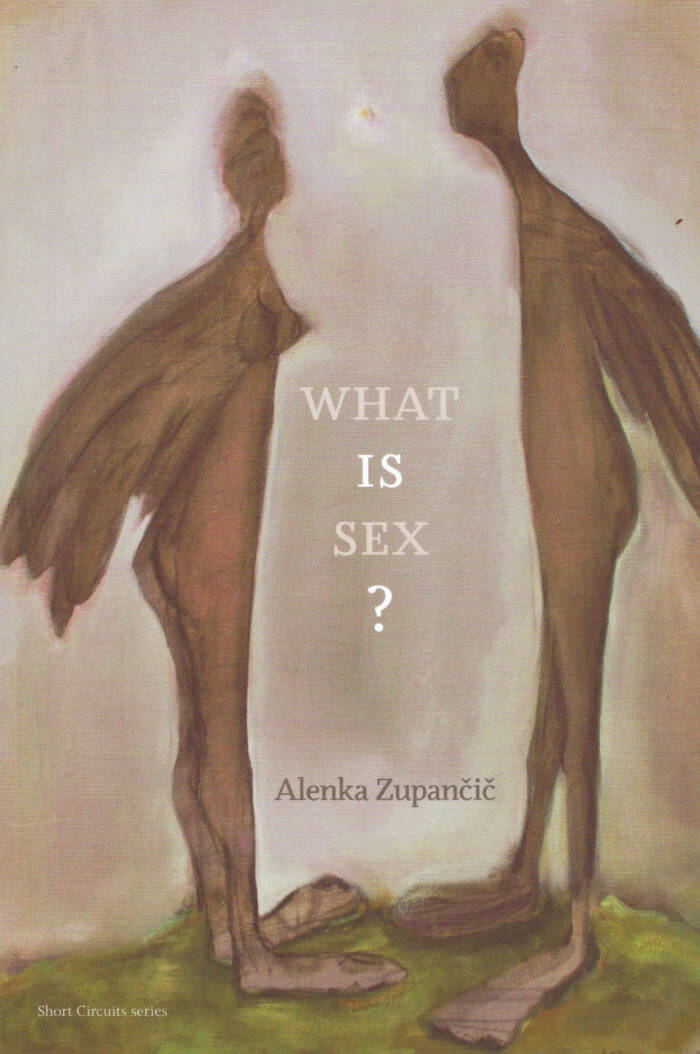
What Is Sex?
Why sexuality is at the point of a "short circuit" between ontology and epistemology.
Consider sublimation, conventionally understood as a substitute satisfaction for missing sexual satisfaction. But what if, as Lacan claims, we can get exactly the same satisfaction that we get from sex from talking (or writing, painting, praying, or other activities)? The point is not to explain the satisfaction from talking by pointing to its sexual origin, but that the satisfaction from talking is itself sexual. The satisfaction from talking contains a key to sexual satisfaction (and not the other way around), even a key to sexuality itself and its inherent contradictions. The Lacanian perspective would make the answer to the simple-seeming question, "What is sex?" rather more complex. In this volume in the Short Circuits series, Alenka Zupančič approaches the question from just this perspective, considering sexuality a properly philosophical problem for psychoanalysis; and by psychoanalysis, she means that of Freud and Lacan, not that of the kind of clinician practitioners called by Lacan "orthopedists of the unconscious."
Zupančič argues that sexuality is at the point of a "short circuit" between ontology and epistemology. Sexuality and knowledge are structured around a fundamental negativity, which unites them at the point of the unconscious. The unconscious (as linked to sexuality) is the concept of an inherent link between being and knowledge in their very negativity.
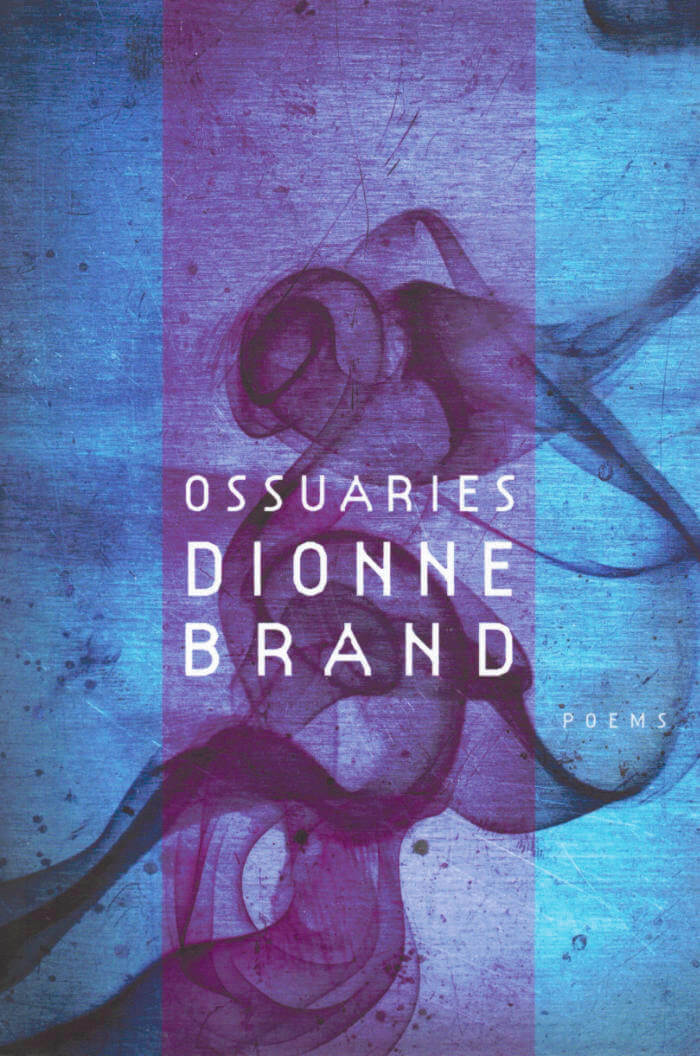
Ossuaries
Dionne Brand's hypnotic, urgent long poem is about the bones of fading cultures and ideas, about the living museums of spectacle where these bones are found. At the centre of Ossuaries is the narrative of Yasmine, a woman living an underground life, fleeing from past actions and regrets, in a perpetual state of movement. She leads a solitary clandestine life, crossing borders actual (Algiers, Cuba, Canada), and timeless. Cold-eyed and cynical, she contemplates the periodic crises of the contemporary world.
A work of deep engagement, sensuality, and ultimate craft from an essential observer of our time and one of the most accomplished poets writing today.

HOOT nr. 1 — Fanny Lallart
Gufo, Clément Faydit and 1 more
Dans ce numéro, nous avons échangé et discuté des pratiques de Fanny Lallart, de la revue SHOW, d'autonomie, de visibilité, de feinte, d'amitié, d'écriture et de travail.
Gufo a rencontré Fanny après qu’elle ait déposé quelques revues SHOW à Giselle’s Books, une bibliothèque indépendante à Marseille. Nous nous sommes retrouvé·e·s au parc Longchamp et puis iel lui a proposé de participer à la revue pour le mois de mai. Iel a attendu quelques jours sa réponse et nous avons convenu d’un rendez vous en visio pour une première conversation: Marseille – Montreuil. Nous avons enlevé les caméras après s’être vu·e·s et nous avons commencé à échanger. Il était 18 ou 19 heures, le soleil s’est couché et nous avons raccroché. Nous nous sommes rappelé·e·s, il fallait revenir sur certains points abordés, les détailler et en démasquer d’autres. Fanny n’était plus à Montreuil mais chez des ami·e·s plus au sud; il y avait une montagne, parfois un peu de vent, c’était peut-être les Cévennes. Notre dernière rencontre s’est faite à Marseille, irl. Fanny nous a apporté un Cash, un jeu de loterie à gratter mais nous avons perdu.
HOOT est une conversation imprimée, une relation orale retranscrite avec un·e travailleur·se du champ de l’art, un·e collectif·ve autour de la notion de travail en tant qu’activité, méthode, environnement, milieu, symbole et nécessité. Chaque mois, entre le 1 et le 31, qu’il s’agisse d’un mercredi ou d’un dimanche, HOOT propose à ses lecteurs·rices, une discussion que nous espérons passionnée, à bouches déliées. Chaque numéro sera retranscrit selon la langue utilisée et partagée lors de la conversation.
HOOT est une revue mensuelle initiée par Gufo, Clément Faydit et Rozenn Voyer.
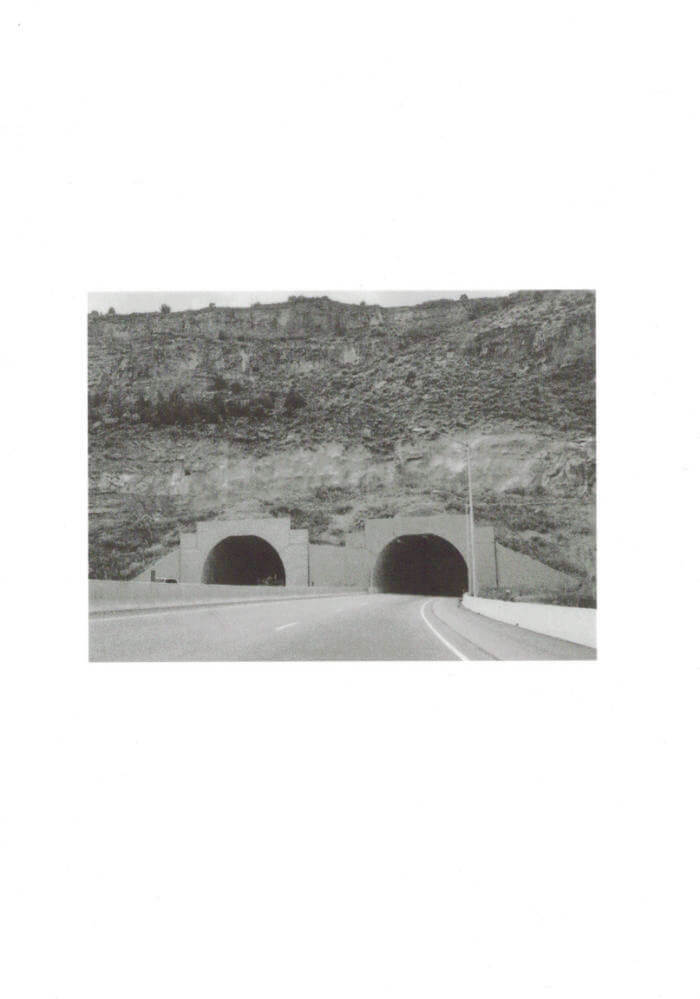
100+more
100+more is het resultaat van een beelden dialoog tussen Jelle Martens en Tim Bruggeman in het voorjaar van 2021. Beide verzamelden ze de voorbije jaren een uitgebreid digitaal archief met beelden van het internet, film stills, schermafbeeldingen, reproducties van kunstwerken en zelfgemaakte beelden. Deze publicatie brengt een selectie van 302 zwart-wit beelden samen vanuit een weloverwogen willekeurigheid.
100+more is the result of a visual dialogue between Jelle Martens and Tim Bruggeman in the spring of 2021. In recent years, both have collected an extensive digital archive with images from the internet, film stills, screenshots, reproductions of artworks and images they created themselves. This publication brings together a selection of 302 black-and-white images from a chosen randomness.
Offset
304 pages
Edition of 250
14 x 20 cm
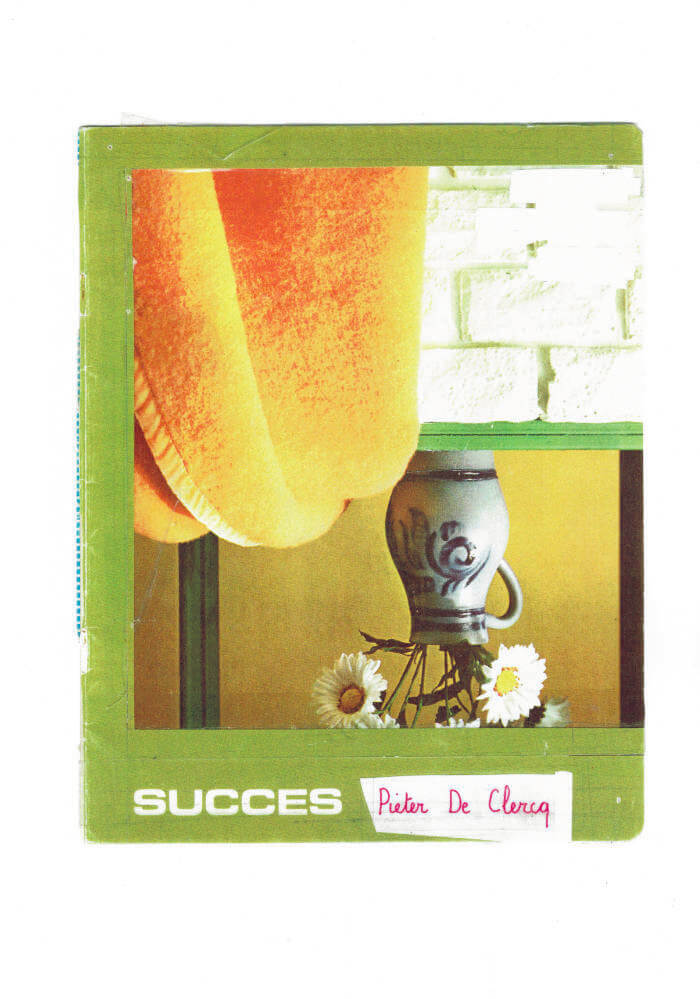
SUCCES
kunststof (20x) kunststof kunststof kunststof
kunststof kunststof kunststof kunststof
kunststof kunststof kunststof kunststof
kunststof kunststof kunststof kunststof
Kunststof
Digital print
104 pages
Edition of 50
21 x 29,7 cm
More images at https://infinitif.org/SUCCES

I'm Not Sad, The World Is Sad
I'm Not Sad, The World Is Sad is an autotheoretical, semi-fictional account of a performance artist who lands a part-time job as an Embedded Artistic Researcher in an art institution. Invested in queer theory and institutional critique, she sets out to perform the artist 'differently' through a process of negation and passivity, inadvertently causing her relationship with the insitution's curator to grow increasingly speculative and paranoid. Louwerens dresses her protagonist in the different professional guises of artistic labour. Het experiences as tour guide, security guard, artist, hostess and researcher at different institutions begin to overlap and blend under the name of 'performance'.
I'm Not Sad, The World Is Sad is a fragmented story of paranoid and reparative reading, script and utterance, exposure and vulnerability.

Dirty Room
Juan Domínguez, Victoria Pérez Roya
CLEAN ROOM is the name of a performance project created by Juan Domínguez and several collaborators that was developed as a three-season series with six episodes in each season. Its name refers to a spotless space, with low levels of external pollutants and controlled environmental parameters that guarantee minimum interferences in the developments of experiments.
DIRTY ROOM is CLEAN ROOM against the light, the negative of CLEAN ROOM, a collection of outlines, notes, ideas, reflections, photographic materials, maps, manifestos, fragments from diaries, transcriptions of conversations, interviews, email exchanges, memoirs, memories and scripts, among other documents from the working and research process that led to CLEAN ROOM. Through this book we invite you to enter the labyrinth of this long and multifaceted process, which had followed simultaneously different directions, moved by different concerns.
Juan Domínguez, a maker and organizer within the fields of choreography and performing arts; and Victoria Pérez-Royo, performing arts researcher.

Where Do You Draw The Line Between Art and Politics
Where Do You Draw The Line Between Art and Politics? consists of a series of interviews with individuals who have been active in various capacities at the intersection of art and politics. Between historical documentation, political memory, dialogic reflections and motivational support, the publication focuses on the experiences, commitments, and feelings that animate and inform aesthetic priorities in social spaces both within and outside of art institutions; a repository designed to inspire and enourage the politicization of aesthetics, as opposed to the aestheticization of politics.
Davide Tidoni is an artist and researcher working with sound and listening. With a particular focus on direct experience, observation, and action, he creates works of different formats that include live performance, intervention, walk, video, audio recording, and text scores. He is interested in the use of sound and music in counter-culture and political struggles and has published a sound based field research on the northern italian ultras group Brescia 1911 (The Sound of Normalisation, 2018).

Lilith, Losing, Lavender
Lilith, Losing, Lavender: A love letter to love, is a publication based on stretching the subjectivities in love from the formulation I love You, as a way of seeing what is under the gaze of western romantic ideas and heteropatriarchal structures that may reveal problems in language about love.
It gathers a collection of texts written throughout the artistic research trajectory of Andrea Zavala Folache. With different narrative styles as diary, love letters, score instructions, this collection imbricates ideas of love, art and life as an essay about conditions of attachment.
In the interstice of several practices as dance, writing and drawing and different spaces as the dance studio, the atelier, the classroom, the theatre and the white cube, Andrea’s research focuses on non chronological dramaturgies for the emergence of surprise or unexpectedness.
Published 2021.
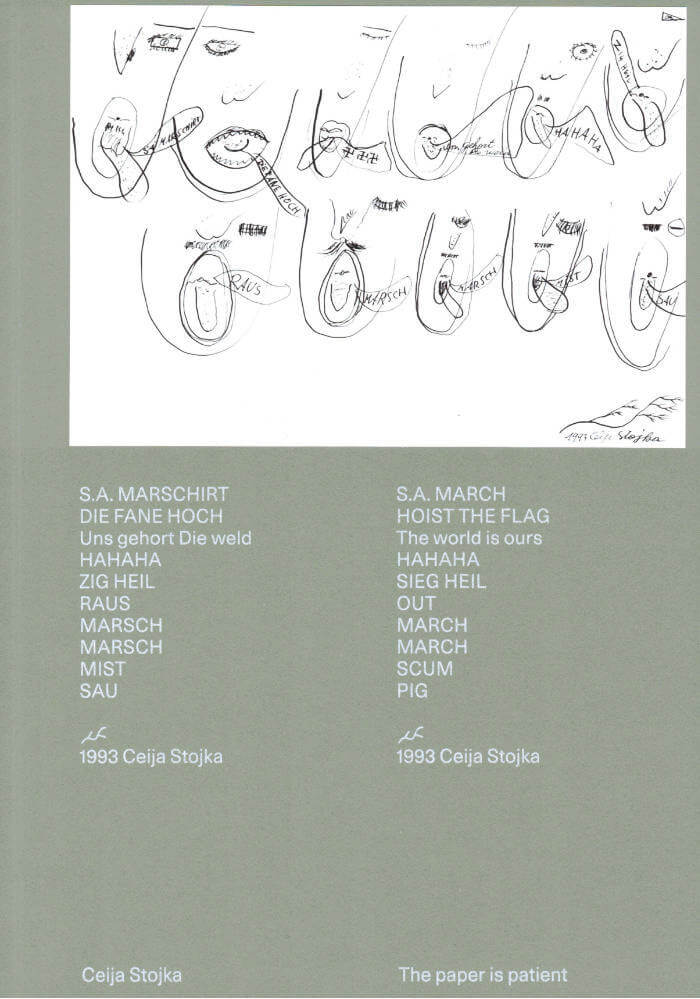
The Paper is Patient
The work of Ceija Stojka (1933-2013) is considered today an invaluable testimony on the deportation and the holocaust of the Romani people during the Second World War. For the very first time, this publication considers equal to her graphic work the notes she wrote on the back of her drawings and paintings. Stojka's particular use of language, phonetically adapted from her knowledge of German, is here transcribed and translated into English, while giving access to both sides of her works.
Published on the occasion of the eponymous exhibition at Malmö Konsthall in 2021.
Ceija Stojka was born in 1933 in Austria to a family of Romani horse traders, the Lovaras. She was still a child when the nazi racial laws drove her into the hell of the concentration camps for 24 months. As a survivor, she covered up this trauma with a heavy silence for almost 40 years. In the 1980s, facing other tragic circumstances in her life, the denial of the Romani holocaust and the resurgence of extreme right-wing racist ideas in Austria, she felt an urgent need to testify. She wrote at first, then started to draw and eventually found her way by blending the two as a self-taught artist. She calls upon us, through her visions of childhood, to never turn a blind eye on what happened, and to remain vigilant as to what may emerge again. Ceija Stojka died in 2013 in Vienna.
Edited by François Piron.
Texts by Ceija Stojka, Noëlig Le Roux, Irka Cederberg.
Graphic design: Coline Sunier & Charles Mazé.
Published in February 2021
English edition
21 x 29,7 cm (softcover)
168 pages (105 ill.)
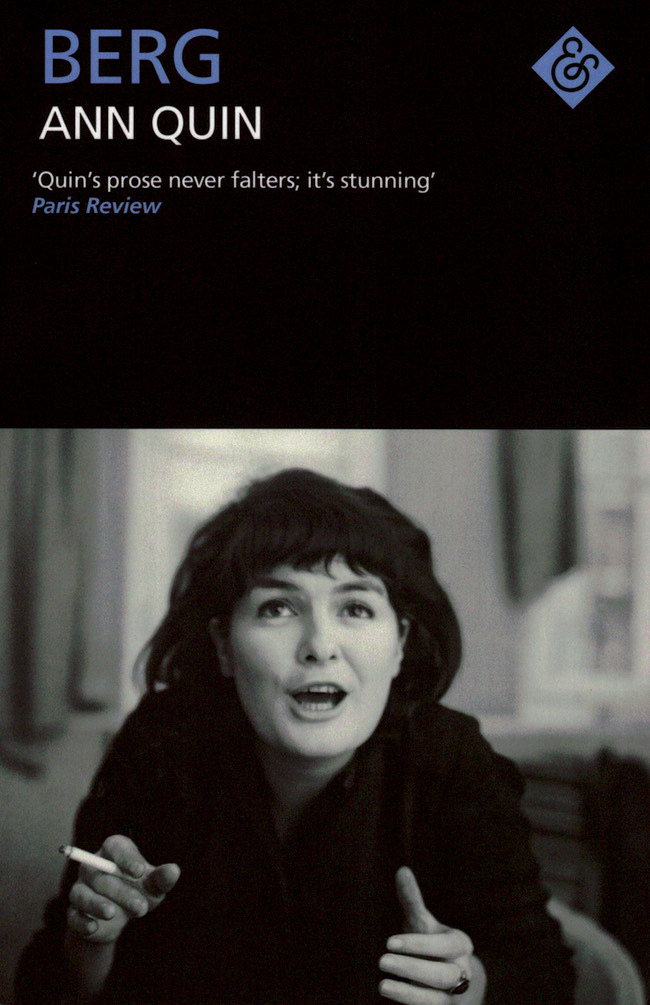
Berg
"A man called Berg, who changed his name to Greb, came to a seaside town intending to kill his father. . ."
So begins Ann Quin's madcap frolic with sinister undertones, a debut "so staggeringly superior to most you'll never forget it" (The Guardian). Alistair Berg hears where his father, who has been absent from his life since his infancy, is living. Without revealing his identity, Berg takes a room next to the one where his father and father's mistress are lodging and he starts to plot his father's elimination. Seduction and violence follow, though not quite as Berg intends, with Quin lending the proceedings a delightful absurdist humor.
Anarchic, heady, dark, Berg is Quin's masterpiece, a classic of post-war avant-garde British writing, and now finally back in print after much demand.
Ann Quin (b. 1936) was a British writer from Brighton. She was prominent amongst a group of British experimental writers of the 1960s, which included B.S. Johnson. Prior to her death in 1973, she published four novels: Berg (1964), Three (1966), Passages (1969), and Tripticks (1972). A collection of short stories and fragments, The Unmapped Country (edited by Jennifer Hodgson) was published by And Other Stories in 2018.
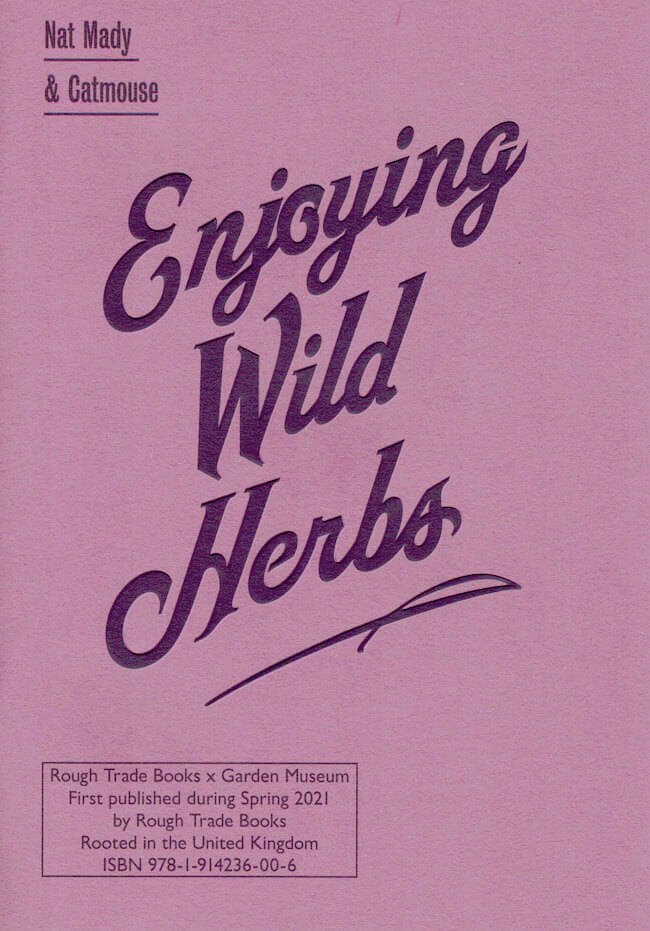
Enjoying Wild Herbs: a seasonal guide
Enjoying Wild Herbs: A Seasonal Guide brings Hackney Herbal’s Nat Mady and illustrator Catmouse together to introduce the wonderful world of herbs. Asking important questions about the nature of public and private space, of how we live alongside plants, how we use them, how we gather them, this is a treatise on how foraging and the knowledge that underpins it can be a radical act—an act that informs much of our attitude to the natural world, to the food we eat and to how we value the multitudinous life that surrounds us.
Published Spring 2021.
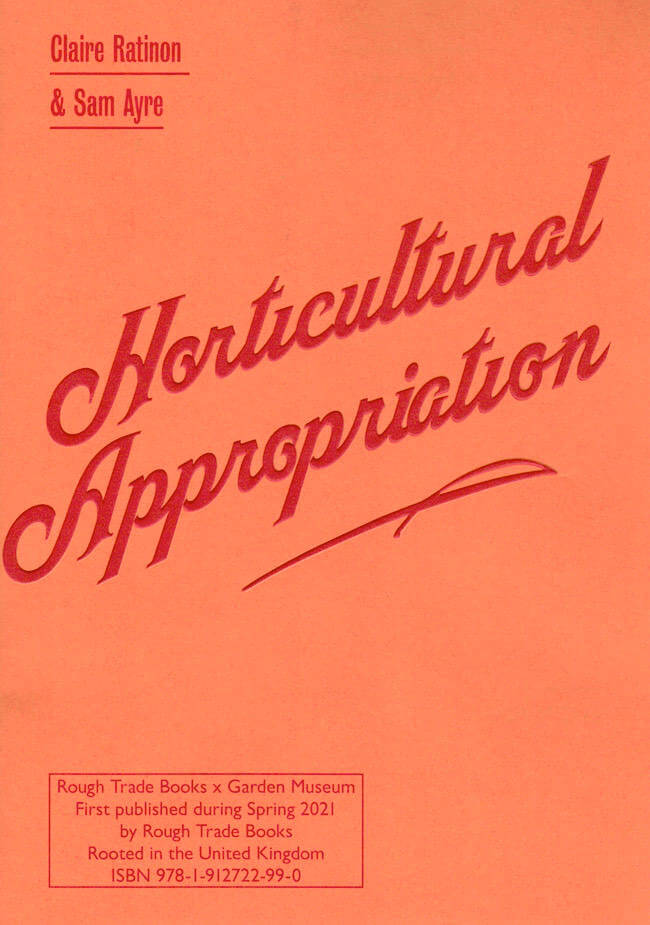
Horticultural Appropriation
Horticultural Appropriation is a conversation between an organic food grower and an artist about the possibility and necessity of bringing a decolonial lens to the practice of horticulture. Taking place within West Dean Art College and Gardens, the exchange explores how attempts to decolonise collections and spaces currently happening in arts and cultural institutions might inform the interrogation of the colonial history at the heart of Britain's gardens and gardening.
Published Spring 2021.
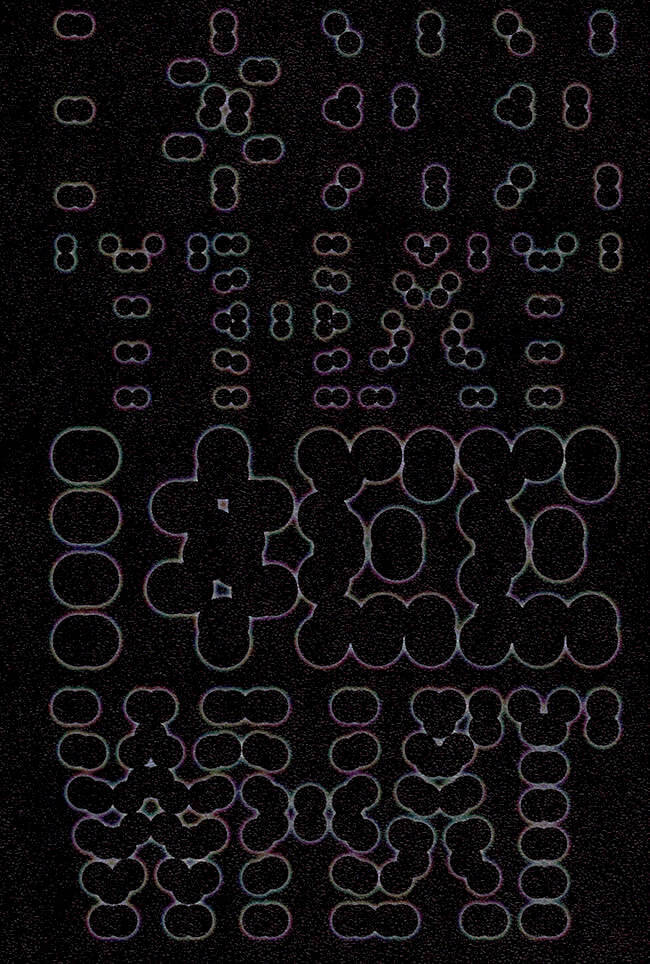
I See That I See What You Don't See
Van Westrenen F., Otero Verzier M.
This “black book” published by Het Nieuwe Instituut presents a layered, non-binary notion of darkness. Navigating through cosmic, automated, and seemingly invisible environments, it delves into what we do not generally get – or choose – to see. Moreover, the book explores the relation between the possibility of seeing and forms of oppression and emancipation. Sharp book design frames contributions by the Academy for Urban Astronauts, Ramon Amaro, Danilo Correale, Jonathan Crary, Aldo van Eyck, Ludo Groen, Bregtje van der Haak, Saidiya Hartman, Marten Kuijpers, Momtaza Mehri, Melvin Moti, Lucy McRae, Johannes Schwartz, Dirk Sijmons, and Leanne Wijnsma.
Dutch/English.
Published 2020.

Sisters of the Wind
Sisters of the Wind is the fruit of artistic research on witches, ecofeminism, and science-fiction carried out between 2018 and 2021 by Juliette Lizotte aka jujulove. It is a story that weaves through seven videos and can be experienced in different ways: an interactive audiovisual performance, an online world-building workshop and role play session, and this publication!
The publication concludes the three world-building workshops and role play sessions part of the project which took place online in February 2021 due to the COVID-19 pandemic, though they were originally intended to unfold in the form of live action role play (larp). This new constraint led us to perform the worldbuilding and role play exercises in an etherpad, an open source digital tool for co-writing text in real-time. The outcome of these sessions was archived and used as material for the publication.
This "choose-your-own adventure" story consists of three parallel worlds that were co-created during three sessions, each lasting three hours. The core of the story was similar, but the direction the sessions took were quite unique. As the story unfolds, you are asked to make decisions to travel from one world to another: creating your own version of the story by following your instinct or challenging your impulses!
Sisters.°·
The wind is returning, as it always does. Sometimes it blows so hard that it carries artifacts away from the cities it tore apart, seeds from far away places, trees that didn’t have enough time to grow stronger... That’s why you always seek a protected area to settle in, relocating as the wind comes and goes in waves. You are witches. You pay attention to the world and try to make sense of this life together through the phases of the moon from maiden to mother to crone. In your community, the feminine spirit dominates, and all gender expressions are celebrated. When your precarious life is threatened by an unsettling prophecy announcing a deadly wind that will prepare the earth for a new cycle, will you go on a journey to find the source of this wind? What will you discover on the way? How will this transform you, your sisters, and the earth forever?
Edition of 100 published by Office of Metaphors, printed in Riso in May 2021 in Amsterdam.

Why Solange Matters
Growing up in the shadow of her superstar sister, Solange Knowles became a pivotal musician in her own right. Defying an industry that attempted to bend her to its rigid image of a Black woman, Solange continually experimented with her sound and embarked on a metamorphosis in her art that continues to this day.
In Why Solange Matters, Stephanie Phillips chronicles the creative journey of an artist who became a beloved voice for the Black Lives Matter generation. A Black feminist punk musician herself, Phillips addresses not only the unpredictable trajectory of Solange Knowles's career but also how she and other Black women see themselves through the musician's repertoire. First, she traces Solange's progress through an inflexible industry, charting the artist's development up to 2016, when the release of her third album, A Seat at the Table, redefined her career. Then, with A Seat at the Table and 2019's When I Get Home, Phillips describes how Solange embraced activism, anger, Black womanhood, and intergenerational trauma to inform her remarkable art.
Why Solange Matters not only cements the place of its subject in the pantheon of world-changing twenty-first century musicians, it introduces its writer as an important new voice.

Three
S has disappeared from Ruth and Leonard's home in Brighton. Suicide is suspected. The couple, who had been spying on their young lodger since before the trouble, begin to pour over her diary, her audio recordings and her movies - only to discover that she had been spying on them with even greater intensity. As this disturbing, highly charged act of reciprocal voyeurism comes to light, and as the couple's fascination with S comes to dominate their already flawed marriage, what emerges is an unnerving and absorbing portrait of the taboos, emotional and sexual, that broke behind the closed doors of 1950s British life.
Ann Quin (1936-1973) was a working-class writer from Brighton, England. She was at the forefront of British experimentalism in the 1960s along with BS Johnson and Alan Burns. Prior to her death in 1973, she published four novels: Berg(1964), Three (1966), Passages (1969) and Tripticks (1972). A collection of short stories and fragments, The Unmapped Country (edited by Jennifer Hodgson), was published by And Other Stories in 2018. Quin's novel Berg was republished by And Other Stories in 2019, followed by Three in 2020.

Passages
A book of voices, landscapes and seasons, Ann Quin's newly republished novel mirrors the multiplicity of meanings of the very word 'passage', of music, of time, and of life itself. A woman, accompanied by her lover, searches for her lost brother, who may have been a revolutionary, and who may have been tortured, imprisoned or killed. Roving through a Mediterranean landscape, they live out their entangled existences, reluctant to give up, afraid of the outcome.
Reflecting the schizophrenia of its characters, the novel splits into alternating passages, switching between the sister and her lover's perspective. The lover's passages are also fractured, taking the form of a diary with notes alongside the entries. An intricate system of repetition and relation builds across the passages. 'All seasons passed through before the pattern formed, collected in parts.'
Ann Quin (1936-1973) was a working-class writer from Brighton, England. She was at the forefront of British experimentalism in the 1960s along with BS Johnson and Alan Burns. Prior to her death in 1973, she published four novels: Berg(1964), Three (1966), Passages (1969) and Tripticks (1972). A collection of short stories and fragments, The Unmapped Country (edited by Jennifer Hodgson), was published by And Other Stories to great acclaim in 2018. Quin's novel Berg was republished by And Other Stories in 2019, followed by Three in 2020.